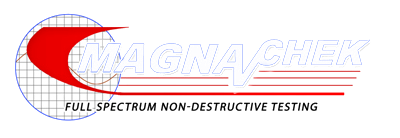Magnetic Particle Inspection uses electrically induced magnetic fields in parts made from ferromagnetic materials to detect flux leakage at the site.
A magnetic field is induced in the test specimen, which is then “dusted” with iron particles, either dry or in a liquid suspension. The particles will collect along the edges of any cracks or other discontinuities that distort the induced magnetic field to provide a readily visible indication of the flaw.
While limited to examining parts made from iron and steel which are strongly affected by magnets (ferromagnetic), Magnetic Particle Inspection is very useful for detecting minute surface and near-surface cracks down to a depth of about 0.100”.
Magnetic Particle Inspection is used to test a wide variety of raw or manufactured materials and components, including castings, forgings and weldments, safety critical automotive parts, and infrastructure, such as bridges or storage tanks.
High volume applications
Magna Chek is equipped with high quality Magna Flux machines to perform magnetic particle testing on a wide variety of parts in terms of both size and geometry. The speed and relative simplicity of this technology make it ideal for high volume applications. Testing is provided on large lots at rates up to 1,500 parts per hour.
12 ft Wet Magna-Glo Unit is our 6,000 amp wet Magna-Glo unit with a secondary 2,000 amp coil that accommodates parts from 1” to 12’ long and up to 24 inches in diameter. The production rate is approximately 1,000 pieces per hour. Utilization of the secondary coil operation allows us to perform head and coil inspection simultaneously.
Conveyorized Two-Shot Magna-Glo Unit with an automatic coil, de-magnetizer and conveyor handles up to 1,500 pieces per hour and is ideal for testing high volume parts such as bolts, screws, etc.
Conveyorized Duo-VEC Wet Magnetic Particle Inspection induces a multi-vector field in the part to detect both longitudinal and transverse defects. This specially designed unit is ideal for testing irregular part configurations up to 24” long such as connecting rods, steering arms, yokes, suspension components, small forgings and castings.
Mobile magnetic particle units
Magna Chek can perform Magnetic Particle Inspection on-site with one of our mobile units. These units may be equipped with a wide variety of NDT units as required by the customer, which allows us to schedule a multiple approach to your materials, and discover both surface and sub-surface discontinuities. We are available for on-site inspection of power generating turbines, boilers, pressure, vessels, structural weld joints, crane assemblies and hooks, handling equipment and pipelines.
Limitations
Only effective in ferromagnetic materials
Discontinuity detection is limited to at or near surface
Parts need to be de-greased and de-magnetized before and after inspection
Magnetic flux must be normal to the plant of the defect to show indications
Advantages
Fast, cost effective, easy to interpret, instant results.
Training is less stringent than for UT, RT or ET.
Positive and reliable method of testing suitable components.
Surface preparation not as critical
Acceptable Standards
ASTM E1444-05
ASTM A 275/A 275M Test Method for Magnetic Particle Examination of Steel Forgings
ASTM A456 Specification for Magnetic Particle Inspection of Large Crankshaft Forgings
ASTM E543 Practice Standard Specification for Evaluating Agencies that Performing Nondestructive Testing
ASTM E 709 Guide for Magnetic Particle Testing Examination
ASTM E 1316 Terminology for Nondestructive Examinations
ASTM E 2297 Standard Guide for Use of UV-A and Visible Light Sources and Meters used in the Liquid Penetrant and Magnetic Particle Methods
ISO 3059, Non-destructive testing – Penetrant Testing and magnetic particle testing – Viewing conditions
ISO 9934-1, Non-destructive testing – Magnetic particle testing – Part 1: General principles
ISO 9934-2, Non-destructive testing – Magnetic particle testing – Part 2: Detection media
ISO 9934-3, Non-destructive testing – Magnetic particle testing – Part 3: Equipment
ISO 17638, Non-destructive testing of welds – Magnetic particle testing
ISO 23279, Non-destructive testing of welds – Magnetic particle testing of welds – Acceptance levels


